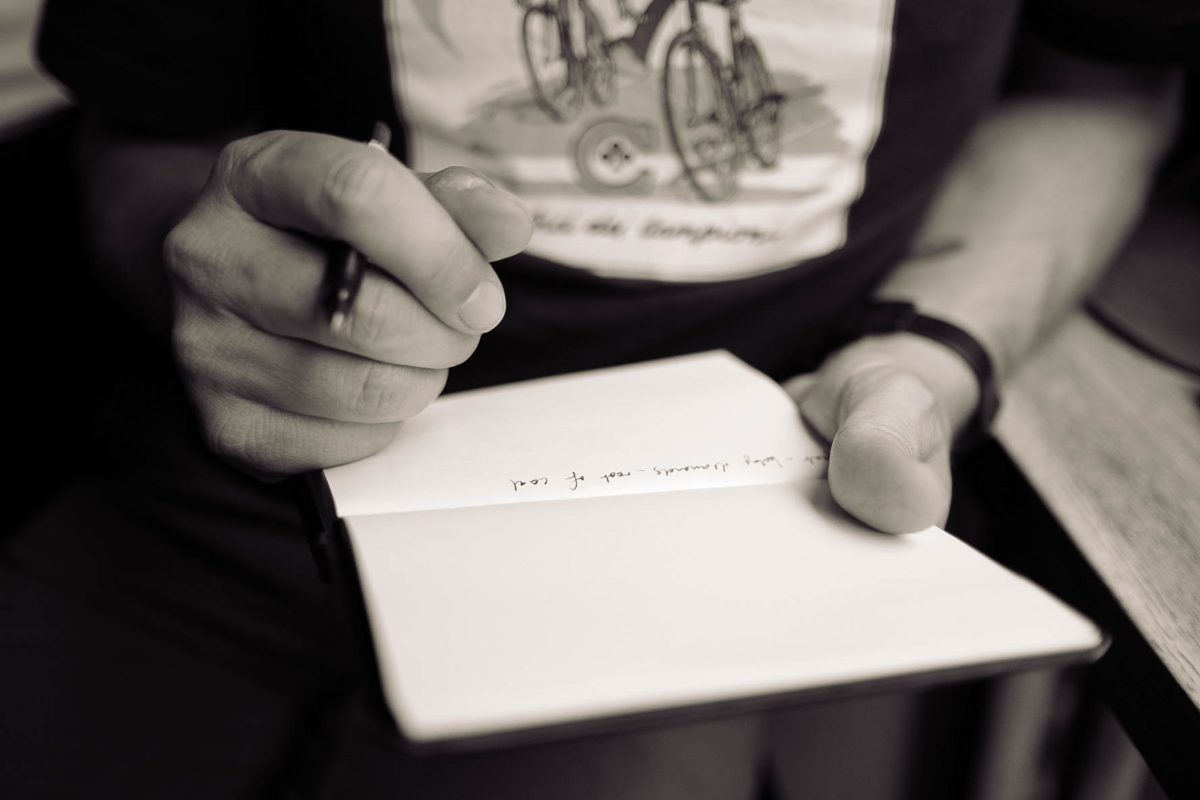To keep writing in the middle of the longest and most painful part of writing is the quit point for many. It is in the Belly of the Beast where all the fears and phobias emerge to resist our best efforts to put words on the page. These are the dark days deep inside the fire beast when we no longer see ourselves, much less our work, in a positive light. We tend to doubt every word we pull through the membrane. This is the time we cannot call ourselves a writer. We feel like fools and charlatans.
This lost time not only happens to the novelist, it also happens to the humble blogger and copywriter as well. In fact it happens to anyone who writes at all. We berate ourselves while we wait for some omniscient force outside ourselves to proclaim our work and us valid.
Writer Error
Ultimately though, we have made an mistake that , as Marcy McCay at The Write Practice put it, is “…both unnecessary and abusive.”
The start was hard, but now the gale sets in. Everything could have been all roses or hell for the first part. Now none of that matters. Now you are past the gates of hell. Out of now where you have been hit and there is really nothing but a shambles, or at least you think that is what you see all about you.
What it does…this fear?
The cause of the mayhem may have been anything. It could have been illness, lost the beat of your working rhythm, or even that someone dared like what you wrote. None of that matters. You have lost the momentum. You are dead in the water and the work has gone into the drawer along with several other unfinished works.
Answer: Keep Writing.
Everyone gets this. It’s expected. You are not cursed, untalented, lazy or a loser. No one creates flawless prose. Even Asimov, as close to a once copy writer as you will find still had to let his brain work through his work a bit to get his work right when he typed it out.
So what can I do? You ask.
How about some tips? Sure. Keep writing. That’s the most important one. Here are more seven ways to slog through the beast instead of giving up.
Start with some grit.
Research by Angela Duckworth, University of Pennsylvania indicates the most important factor including intelligence and talent to achieve a goal is grit. It is our resilience in times of failure and adversity coupled with our consistent pursuit over time that seems to make the key difference.
“’Grit’ as Duckworth defines it, is having passion and perseverance, sticking to long term goals and having the emotional stamina to keep going, when others have given up. Grit is living life like a marathon, not a sprint. ” from Why You Should Live Life as a Marathon not a Sprint
Duckworth’s research shows that most people tend to quit at the first sign of frustration or confusion. It is not uncommon for many people to stop working to improve after they have achieved a certain level of proficiency.
Grit is Everywhere
We all have grit, our problem is we often forget that we have it. It takes grit to achieve any long term project from a high school or college diploma to rank in a martial art to becoming an instructor of any kind. Every human effort of any worth requires we access some grit. The trick to remember is that you already have it.
We need not look too far to find grit in others either. The sheer number of people who needed grit is found everywhere from Nelson Mandela who said, “Do not judge me by my success, judge me by how many times I fell down and got back up again.” to JK Rowling who was rejected by a dozen publishers before Scholastic Press accepted Harry Potter and the Sorcerer’s Stone then took seven-teen years to finnish the entire series itself. The record is pretty clear. No one gets a free ride to success. You are going to fall down, likely a lot. The only free ride is the one to achieve nothing. The writing world is no different than any other either. Here is a list of 50 famous authors and their track records.
What is Grit?
Grit itself is a form of self-control by delayed gratification and distraction management. Grit is the work you do when you keep writing.
Marshmallow Study
The long documented marshmallow study that gave kids a chance for two marshmallows instead of one by waiting has long been held as an example of how people could control themselves. The long terms of the study have been shown that the kids who could defer gratification in the test tended to do better in other key areas like grades, popularity, income, lower BMIs down the road, and less drug abuse.
Resillence
Writers have to write consistently to improve their skills and create the library of work that will ensure their eventual success. A writer must be able to resist temptations or distractions that pull them from the pages and allow them to bounce back when they do fall.
Keep Writing
To that end here are some suggestions to keeping going when you feel you want to quit. You can also add in a little Unlimited Willpower to the mix. Now write. Finish that project.
Know what motivates you.
Knowing why you want to finish is about the only way to have a clear sense of purpose from the start. Our whys are the keys that inspire us to get up and get things done. We do not act on what we want to do, but why we want to do it. Simon Sinek has a great talk on this. Start with why — how great leaders inspire action
Often we get caught in the how of our projects because we lose sight of the why. Why would anyone spend time every day just scribbling? There are a lot more fun and interesting things to do than opening up a vein and letting your inner thoughts flow out into the keyboard.
Take some time and ask yourself why. That why is what will pull you through not only the dark night that is the middle of your project, but every other point in the project as well.
Practice mindfulness.
Being aware and accepting in the moment is one of those key skills that helps us not only to focus on the project but also releases a lot of negative issues like stress. It also allows you to avoid those emotions that knock you off track. Most key here is the fact that mindfulness practices inhibit impulses so we procrastinate less. Here are some ways to integrate some mindfulness into your work and a mindful writing practice.
Manage the self-talk
The inner critic is sneaky. Your critic hates it when you keep writing. Becoming aware of what you are actually telling yourself about your work and yourself is one of those devilish details that is heard in every writer’s head. The winning game plan is to have some self-compassion for yourself and work the problem.
Most people are very hard on themselves in the hope that they will do better. The reality though is that it is not very useful because people fail to see the difference between useful criticism and harsh judgment. They default to harsh self judgment. Being judgmental when you slip up makes it harder to stay on track.
Being compassionate for your failures allows you suspend harsh personal criticism in favor of seeing your errors as problems to solve.
“Because the prolific person is focused on problem-solving rather than remorse and self-recrimination, she will typically either a) recover quickly from obstacles and triggers, or b) not even perceive them in the first place.” Hillary Rettig, The 7 secrets of the Highly Prolific
Shift your focus to keep writing
Too many people tend to spend most of their time focuse focus on past or future at the wrong time to work in the present. There is only one place to keep our minds while we are working. That is right here and right now. You will flub up if you are busy in the past looking at some failure or off in the future with some win that is not even moving forward. As Steven Pressfield is fond of saying “Do the work.”
When we put our focus on the work we need to do today, things get done. It is that simple. Looking at the past is great when planning. A view to the goal is great for inspiration and lining up the day’s work with your goal. Use those viewpoints that way. But the work is totally the only thing you should think about when you are at work today.
Learn how to regulate your emotions
Our emotions can trip us up. A bad mood about the work or in general can bring on procrastination in a rush. Getting a handle on our emotions is another area to develope a professional mindset that keeps us at our pages regardless of our mood. The fact is the writer who gets his pages in every day is much like the swimmer who gets her laps in every day. Both will always feel better for the session than having not skipped it.
A couple of tricks to keep writing
Celebrate the small wins, especially those days the emotions started out bad. Beating your off days by doing the work is a win. Celebrate that win.
Write on your feelings first. This can help you process the negatives and warm up for the writing work in one shot.
Reframe your fear as excitement. Alison Wood Brook, performance anxiety researcher, explains it as:
“When people feel anxious and try to calm down, they are thinking about all the things that could go badly. When they are excited, they are thinking about how things could go well.”
Shift into a growth mindset to keep writing
If you work from the perspective of getting things right, psychologists say that you are likely going to see mistakes as failures and a poor reflection of your skills. You are also likely to avoid getting feedback on your work or try to do everything yourself.
Shifting your mindset from perfectionism to a learning growth based reference with the goal to get better focuses us on getting feedback and taking challenges that improve us. It also allows us to reframe rejection and failures as learning experiences so that we can bounce back faster to move on to the next step.
My take
Getting through the grind of your beast is going to take a lot out of you. It is going to force you to grow and will force you to meet and take out your personal fears. That is the key point. The only thing holding you back is fear itself. Don’t let it. Write. Then keep writing.
Photo by Calum MacAulay on Unsplash









